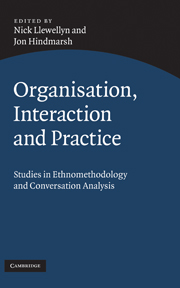Book contents
- Frontmatter
- Contents
- List of contributors
- Preface
- Part I Orientations
- Part II Studies
- 3 A kind of governance: rules, time and psychology in organisations
- 4 On the reflexivity between setting and practice: the ‘recruitment interview’
- 5 The situated production of stories
- 6 Orders of bidding: organising participation in auctions of fine art and antiques
- 7 Some major organisational consequences of some ‘minor’, organised conduct: evidence from a video analysis of pre-verbal service encounters in a showroom retail store
- 8 The work of the work order: document practice in face-to-face service encounters
- 9 The interactional accomplishment of a strategic plan
- 10 Peripherality, participation and communities of practice: examining the patient in dental training
- List of references
- Index
3 - A kind of governance: rules, time and psychology in organisations
Published online by Cambridge University Press: 20 May 2010
- Frontmatter
- Contents
- List of contributors
- Preface
- Part I Orientations
- Part II Studies
- 3 A kind of governance: rules, time and psychology in organisations
- 4 On the reflexivity between setting and practice: the ‘recruitment interview’
- 5 The situated production of stories
- 6 Orders of bidding: organising participation in auctions of fine art and antiques
- 7 Some major organisational consequences of some ‘minor’, organised conduct: evidence from a video analysis of pre-verbal service encounters in a showroom retail store
- 8 The work of the work order: document practice in face-to-face service encounters
- 9 The interactional accomplishment of a strategic plan
- 10 Peripherality, participation and communities of practice: examining the patient in dental training
- List of references
- Index
Summary
Introduction
In the past fifteen years researchers in conversation analysis and discursive psychology have developed novel conceptions of the relationship between organisations, practices and individual psychology (Boden and Zimmerman 1991b; Drew and Heritage 1992b; Edwards and Potter 1992; Hepburn and Wiggins 2007a). They have built an approach to human conduct in institutional settings which is distinct from those traditionally offered in the disciplines of sociology, psychology and organisation studies. This distinctiveness comes from an analytic focus on records of actual organisations at work, supported by new recording technology and new representational forms that enable a more immediate engagement with human practices than is offered by questionnaires, interviews or ethnographic field notes and observations. At the same time it is derived from a rigorous focus on the orientations and constructions of organisational members as these are displayed in interaction itself (rather than reported post hoc in questionnaires or interviews).
In the field of organisational studies these approaches provide one powerful answer to calls to ‘open the black box’ so as to understand the ‘actual behaviour’ of organisations such as boards of companies (Huse 2005) and one way of moving ‘beyond agency theory’ in empirical work on companies (Pye and Pettigrew 2005). Although conversation analysts and ethnomethodologists have shown a sporadic interest in the nature and organisation of meetings and topics that have traditionally been the purview of organisation science, with the exception of Deirdre Boden's (1994) book on the ‘business of talk’ this has rarely come together in a sustained empirical programme (but see important contributions from M. A. Atkinson, Cuff and Lee 1978; C. Baker 1997; Boden 1995; Cuff and Sharrock 1985; Housley 1999, 2000; Huisman 2001).
- Type
- Chapter
- Information
- Organisation, Interaction and PracticeStudies of Ethnomethodology and Conversation Analysis, pp. 49 - 73Publisher: Cambridge University PressPrint publication year: 2010
- 12
- Cited by

